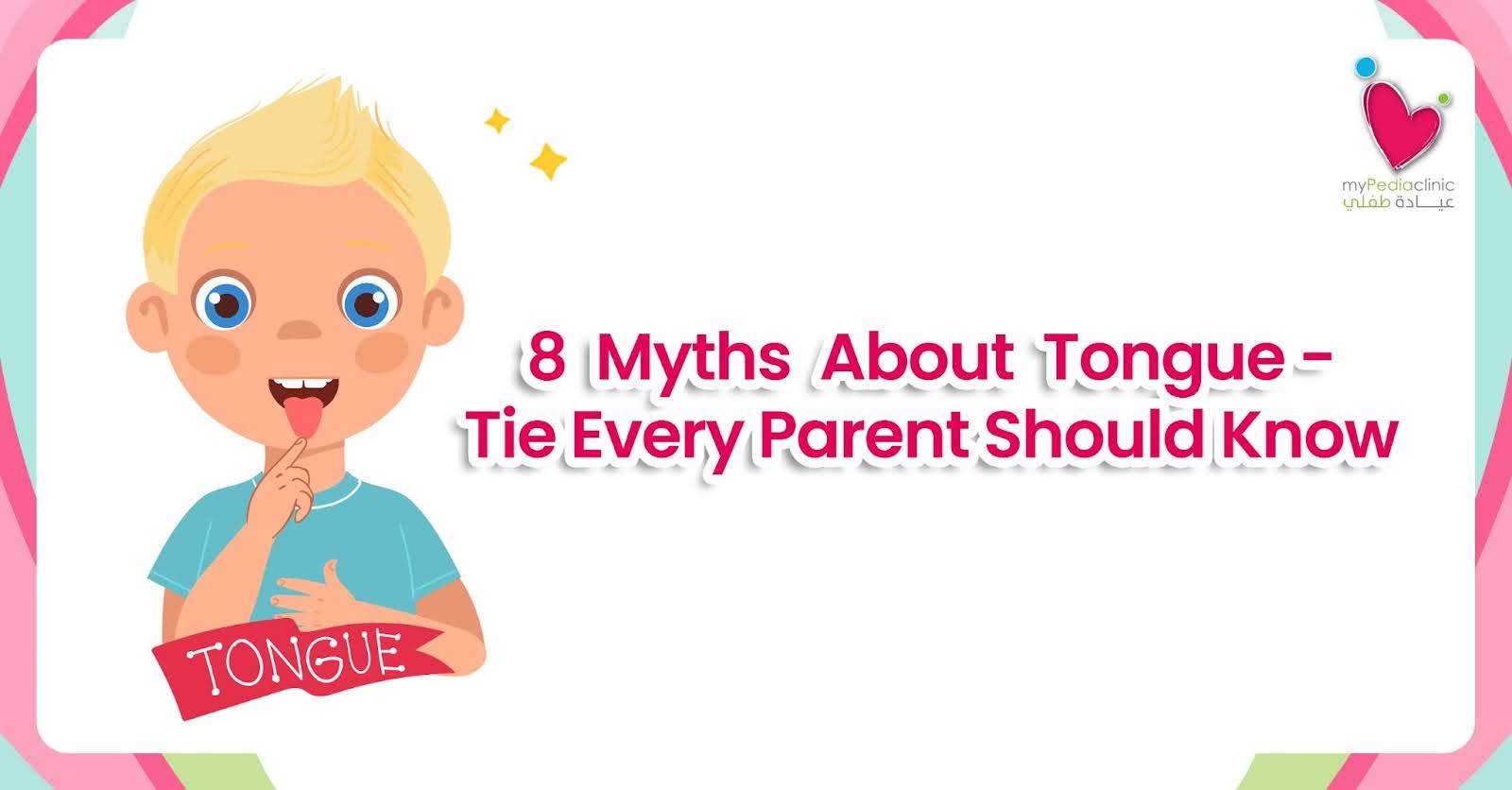Understanding Tongue-Tie: Separating Fact from Fiction
Tongue-tie, medically known as ankyloglossia, has gained significant attention among parents and healthcare providers in recent years. While increased awareness helps families recognize and address this condition, it has also spawned numerous myths and misconceptions that can confuse parents making important healthcare decisions for their children. Consulting with a pediatric dentist in Dubai who specializes in tongue-tie assessment and treatment helps families navigate these complexities with accurate information.
Understanding the truth about tongue-tie enables parents to make informed decisions about their child’s care, recognizing when intervention is necessary and when watchful waiting is appropriate. Let’s examine eight common myths about tongue-tie and reveal the evidence-based facts.
What is Tongue-Tie?
Tongue-tie is a congenital condition where the lingual frenulum, the strip of tissue connecting the underside of the tongue to the floor of the mouth, is unusually short, thick, or tight. This restriction limits the tongue’s range of motion, potentially affecting various functions including feeding, speech, breathing, and oral development.
The condition exists on a spectrum from mild restriction with minimal impact to severe limitation causing significant functional problems. Not all tongue-ties require treatment, making professional assessment essential for appropriate management.
Myth 1: All Tongue-Ties Need to Be Treated Immediately
The Truth
Not every tongue-tie requires intervention. The decision to treat depends on whether the restriction causes functional problems. A pediatric dentist and pediatrician in Dubai evaluate whether tongue-tie affects feeding, breathing, speech, oral hygiene, or quality of life before recommending treatment.
Mild tongue-ties without symptoms may never require treatment. Some children with minor restrictions adapt well, developing compensatory strategies that allow normal function. Treatment becomes necessary when tongue-tie demonstrably impairs feeding efficiency, causes persistent breastfeeding difficulties, contributes to speech problems, leads to dental or orthodontic issues, or creates social or psychological concerns.
The best approach involves thorough functional assessment by experienced professionals who can distinguish between tongue-ties requiring intervention and those that can be monitored without immediate treatment.
Myth 2: Tongue-Tie Only Affects Breastfeeding
The Truth
While breastfeeding difficulties often bring tongue-tie to initial attention, the condition’s impact extends far beyond infancy. Tongue-tie can affect multiple aspects of development and function throughout childhood and even adulthood.
Feeding Beyond Breastfeeding
Tongue-tied children may struggle with bottle feeding, eating solid foods, licking ice cream cones, and chewing certain food textures. These challenges can persist throughout childhood if not addressed.
Speech Development
Significant tongue-tie can impair articulation of certain sounds, particularly those requiring tongue-tip elevation like “t,” “d,” “l,” “n,” “th,” and “r.” Children may develop speech compensations that become habitual, potentially requiring speech therapy even after tongue-tie release.
Oral Hygiene Challenges
Limited tongue mobility makes it difficult to clear food debris from teeth, increasing cavity risk. The inability to effectively sweep the mouth clean with the tongue contributes to dental health problems.
Orthodontic and Airway Issues
Tongue-tie affects jaw development, dental arch formation, and airway size. The tongue’s resting position against the palate naturally stimulates upper jaw growth. When tongue-tie prevents this positioning, it can result in narrow palate, crowded teeth, altered facial development, and reduced airway space contributing to breathing disorders.
Social and Psychological Impact
Older children and adults with tongue-tie may experience difficulty kissing, playing wind instruments, licking lips, cleaning teeth with tongue, and frustration or self-consciousness about these limitations.
Myth 3: Tongue-Tie Will Resolve on Its Own
The Truth
Tongue-tie is a structural abnormality that doesn’t spontaneously resolve. The frenulum doesn’t lengthen or stretch sufficiently on its own to eliminate restriction. While some infants develop feeding compensations that reduce breastfeeding difficulties, the underlying anatomical restriction persists.
Waiting for tongue-tie to “get better” often allows secondary problems to develop. Untreated tongue-tie may contribute to increasingly narrow dental arches, worsening sleep-disordered breathing, firmly established compensatory speech patterns, and chronic dental problems.
Earlier intervention typically yields better outcomes, preventing secondary complications that become more challenging to address later. However, tongue-tie can be successfully treated at any age when functional problems are present.
Myth 4: Tongue-Tie Release is Painful and Traumatic for Babies
The Truth
Modern tongue-tie release procedures, particularly when performed on young infants, are minimally invasive with very brief discomfort. The lingual frenulum contains few nerve endings and minimal blood supply, especially in young babies.
The procedure itself takes only seconds to minutes. Babies typically cry briefly during the procedure but often calm immediately when returned to the breast or given a bottle. Most infants feed normally within minutes of the release.
The best kids dentist in Dubai uses techniques including precision scissors, laser technology, or other gentle methods that minimize discomfort and bleeding. Post-procedure pain is generally mild and manageable with acetaminophen if needed.
The discomfort from the brief procedure is typically far less than the ongoing frustration and pain many babies experience from feeding difficulties caused by untreated tongue-tie.
Myth 5: Tongue-Tie Doesn’t Affect Bottle-Fed Babies
The Truth
While bottle feeding may seem easier than breastfeeding with tongue-tie, affected babies still experience difficulties. Tongue-tie impacts bottle feeding through inefficient sucking requiring longer feeding times, excessive air swallowing causing gas and reflux, poor seal around the nipple leading to milk leakage, and jaw and facial fatigue from compensatory feeding strategies.
Additionally, bottle-fed babies with tongue-tie still face risks of speech problems, dental issues, airway development concerns, and other long-term complications. Bottle feeding doesn’t eliminate tongue-tie’s impacts beyond immediate infant feeding.
Parents shouldn’t dismiss tongue-tie evaluation simply because their baby tolerates bottle feeding. Functional assessment by professionals determines whether treatment benefits outweigh the minor procedure risks.
Myth 6: Speech Problems Always Indicate Tongue-Tie
The Truth
While tongue-tie can cause speech difficulties, not all speech problems result from tongue restriction. Many factors influence speech development including hearing, cognitive development, exposure to language, oral motor skills, and developmental timing.
Conversely, not all children with tongue-tie develop speech problems. Many adapt successfully, developing clear speech despite anatomical restriction. Pediatricians in Dubai note that the relationship between tongue-tie and speech is complex and individual.
Children with speech delays or articulation difficulties require comprehensive evaluation by speech-language pathologists who can identify specific causes. If tongue-tie contributes to speech problems, release combined with speech therapy typically yields the best results.
Myth 7: Tongue-Tie Release Always Fixes All Problems Immediately
The Truth
While tongue-tie release creates anatomical freedom for proper tongue movement, it doesn’t instantly correct all associated problems. The procedure provides opportunity for improvement but doesn’t guarantee immediate resolution of all difficulties.
Breastfeeding Improvements
Feeding often improves quickly after release, but babies and mothers may need time to unlearn compensatory patterns and establish efficient feeding. Lactation support following the procedure optimizes breastfeeding outcomes.
Speech Correction
For older children with established speech patterns, tongue-tie release alone rarely resolves speech problems. Speech therapy helps children learn to use their newly mobile tongue for proper articulation.
Myofunctional Retraining
Children who developed compensatory oral muscle patterns need myofunctional therapy to retrain proper tongue posture, swallowing, and breathing patterns. Without retraining, old habits may persist despite anatomical freedom.
Orthodontic Changes
While tongue-tie release can support healthier dental development, it doesn’t reverse existing orthodontic problems. Established narrow arches or crowding may still require orthodontic treatment, though earlier release can prevent worsening.
Realistic expectations combined with appropriate follow-up therapy maximize benefits of tongue-tie release.
Myth 8: Any Healthcare Provider Can Accurately Diagnose and Treat Tongue-Tie
The Truth
Tongue-tie assessment and treatment require specialized knowledge and experience. Not all healthcare providers receive comprehensive training in recognizing functional tongue-tie or performing optimal release procedures.
Expertise Matters
The best pediatric dental clinic in Dubai employs practitioners with specific tongue-tie expertise who understand the nuances of functional assessment beyond simple visual examination. Experienced providers evaluate how tongue restriction affects feeding, breathing, oral development, and function, not just frenulum appearance.
Technique Differences
Release technique significantly impacts outcomes. Providers skilled in tongue-tie procedures ensure complete release, address posterior tongue-tie when present, minimize bleeding and discomfort, and educate families about post-procedure exercises and follow-up care.
Seeking evaluation and treatment from practitioners specializing in pediatric tongue-tie increases the likelihood of accurate diagnosis and successful outcomes. Ask about provider experience, training, and approach to tongue-tie when selecting a practitioner.
Making Informed Decisions About Tongue-Tie
Understanding the facts about tongue-tie empowers parents to make appropriate healthcare decisions. If you suspect your child has tongue-tie, seek evaluation from qualified professionals who can assess functional impact and recommend appropriate interventions.
When to Seek Evaluation
Consider tongue-tie evaluation if your infant or child experiences difficulty breastfeeding or bottle feeding, poor weight gain or growth, speech delays or articulation problems, dental issues or difficulty with oral hygiene, snoring or sleep-disordered breathing, or any other concerns possibly related to tongue mobility.
Questions to Ask Healthcare Providers
During evaluation, ask providers about their specific experience with tongue-tie, functional assessment methods beyond visual examination, treatment approach and techniques used, post-procedure care and follow-up recommendations, and realistic expectations for improvement.
Informed parents who understand both the capabilities and limitations of tongue-tie treatment make better decisions aligned with their child’s needs.
Frequently Asked Questions About Tongue-Tie
1. Can tongue-tie be diagnosed before birth?
Tongue-tie cannot be reliably diagnosed through prenatal ultrasound. The condition is identified after birth through clinical examination of the infant’s oral anatomy and feeding function. Some healthcare providers perform routine newborn oral examinations to identify tongue-tie early, while others assess it when feeding difficulties arise.
2. Is there a genetic component to tongue-tie?
Research suggests genetic factors influence tongue-tie development. The condition often runs in families, with multiple family members across generations affected. If you or your partner had tongue-tie, or if older children have it, subsequent children have increased likelihood of tongue restriction. However, genetics don’t guarantee every child will be affected.
3. What is the difference between anterior and posterior tongue-tie?
Anterior tongue-tie involves visible restriction of the tongue tip with the frenulum attached near the tongue’s front. It’s easily visible when the baby lifts their tongue. Posterior tongue-tie involves restriction further back where the frenulum is thicker and submucosal, often less visible but equally or more functionally significant. Both types can cause problems and may require treatment.
4. Will my baby need anesthesia for tongue-tie release?
For young infants, tongue-tie release is typically performed without anesthesia or with only topical anesthetic gel. The procedure is so brief that general anesthesia risks outweigh benefits. For older children, local anesthesia may be used for comfort. General anesthesia is rarely necessary for simple tongue-tie release.
5. Can tongue-tie recur after release?
Reattachment can occur if the release site heals back together, though this is uncommon when proper post-procedure exercises are performed. Pediatric dentists recommend specific stretching exercises for several weeks following release to prevent reattachment. Incomplete initial release may also create the appearance of recurrence when actually the full restriction was never addressed. Proper technique and aftercare minimize these risks.
Expert Tongue-Tie Assessment and Treatment at myPediaclinic Dubai
At myPediaclinic, our experienced pediatric dentists and pediatricians specialize in comprehensive tongue-tie evaluation and treatment. We understand the complexities of this condition and provide evidence-based care that addresses individual needs rather than following one-size-fits-all protocols.
Our team performs thorough functional assessments examining feeding efficiency, oral anatomy, tongue mobility, breathing patterns, and developmental considerations. We don’t base treatment recommendations solely on frenulum appearance but on actual functional impact.
We utilize gentle, precise release techniques that minimize discomfort while ensuring complete freedom of tongue movement. Our approach includes comprehensive post-procedure education about exercises, feeding support, and monitoring for optimal outcomes.
As a multidisciplinary pediatric clinic, we coordinate care between dentistry, pediatrics, lactation support, and speech therapy when needed. This integrated approach ensures all aspects of tongue-tie’s impact are addressed comprehensively.
We believe in empowering families with accurate information, helping you understand your child’s specific situation and make informed decisions. Our compassionate team takes time to answer questions, address concerns, and provide ongoing support throughout the assessment and treatment journey.
Contact myPediaclinic today to schedule a tongue-tie evaluation. Our experienced specialists are committed to helping your child achieve optimal feeding, speech, breathing, and oral development through expert, individualized care.





